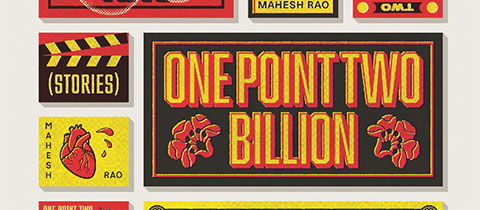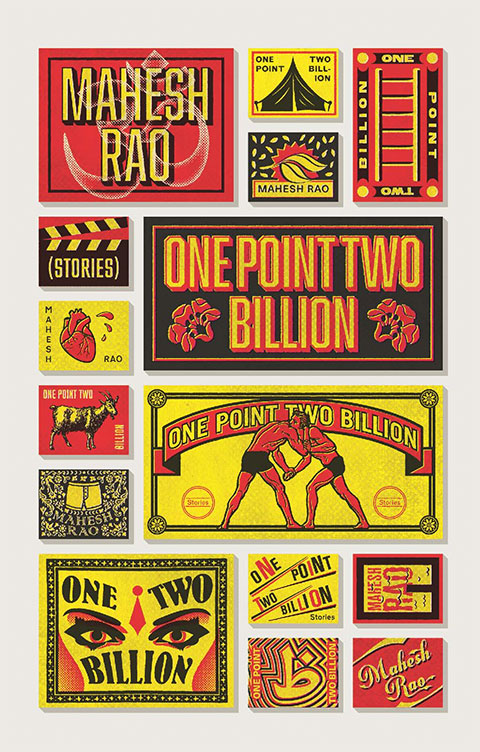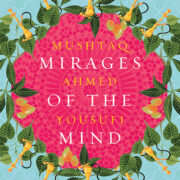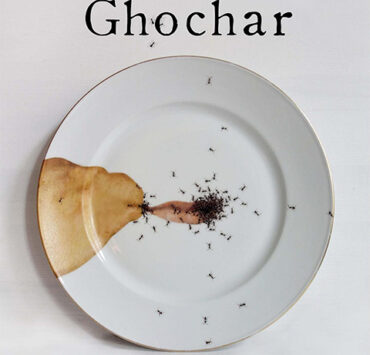Are Wallace Stevens’ thirteen notes about a blackbird too few or too many? How many stories are enough to speak for a nation with disparate parts? Is thirteen too timid a number for the world’s largest democracy?
I ask these banal questions because they seem central to this book’s success. The title of Mahesh Rao’s book One Point Two Billion (which is the population of India) makes an audacious claim: can the book back it up?
The people who inhabit these thirteen stories are the ones we don’t see, but there is nothing exotic or outlandish about them. They live in the same spaces the rest of us do, they occupy the vision at the corner of our eyes as we work and survive in increasingly globalised and modern towns and cities. But their stories haven’t been told yet. Their masks stay intact when they speak to us, even if we speculate about what they are hiding. The sex life of a woman who takes care of her elderly, invalid parents. The teenage girl who navigates being rich with the new intrusion of her father’s girlfriend. The man who trains under a guru in an akhara to become a wrestler. The girl who returns from Ithaca to deal with the discovery of a mass grave on her family’s property in Assam.
In an article about this book, Anuradha Roy wonders how he did it, whether he learned ten languages and travelled widely to learn these stories. When I finished reading this book, that was the question that sat at the centre of me: how does he know? How does he know us and our neighbours so well? It is not his access to these stories that is incredible. It is his manner of recreating their private universe so insightfully that the reader lives empathetically inside the story in a way that Indian literature has rarely done before. He does not minutely describe the traditional meal or idiosyncratic rituals of a particular community. Instead, we enter into the lives of the characters through their minds. He appears to have been observing them long enough to see them as more than unusual, more than representations of cultural specificities. There is more to them than the obvious and he takes the reader on that journey of slowly comprehending who these people are and why they do the inexplicable things they do.
The characters in this collection are haunted by the past or by a world just beyond their reach. They speak of and speak to a disillusioned India who was promised a different world from the one they eventually got. Each story has a different narratorial voice, which sets it apart from most short story collections. Rao’s mastery of his craft is undeniable, but some of his stories are more compelling than others. In sentences such as these, he slices to the heart of situations: “They realised it was the family’s good fortune that she turned out to be more shrewd and industrious than any of the Chauhan brothers, but that she also possessed the caution to disguise these qualities.” In a sentence, decades of a grandmother’s life, invisibly at the helm of her family, are described. In a bid to be understated, some stories remain just short of compelling. The best ones, in my opinion, are The Philanderer, The Pool, and The Agony of Leaves. These stories are the ones that unravel self-assured characters and remind us of our own vulnerability.
I will admit I was sceptical when I picked up this book. I knew Mahesh Rao grew up in Nairobi. I was wary of the expatriate eye on life in India. Growing up, I was alienated by the work of Naipaul and Rushdie who wrote about India as if they could not bear it, so of course it was an unbearable place. Rao’s prose does not dwell on Indian-isms, criticise or generalise. Instead, his book is a sympathetic gathering of lives. His India is recognisable at times, and believable at others.
[HarperCollins India; ISBN 9789351774846]








